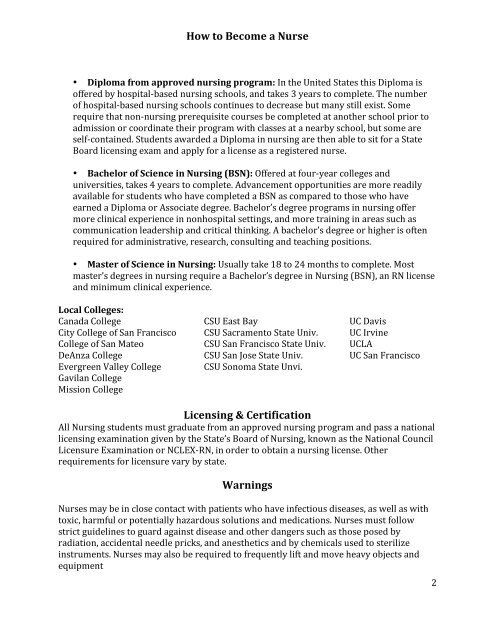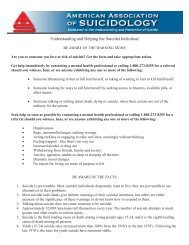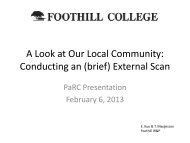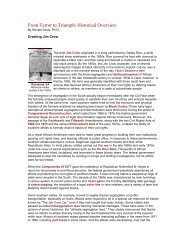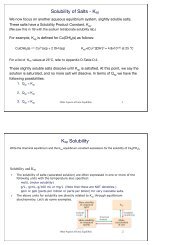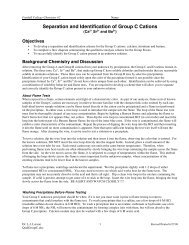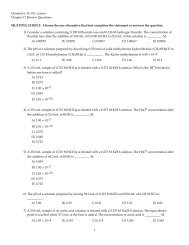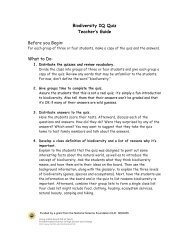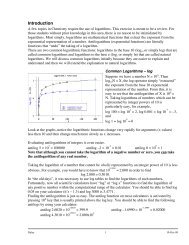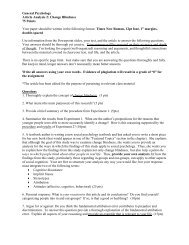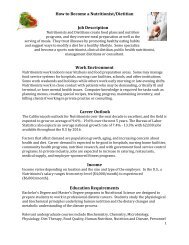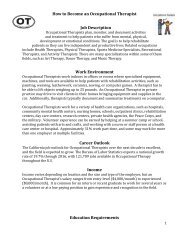How to Become a Nurse 1 - Foothill College
How to Become a Nurse 1 - Foothill College
How to Become a Nurse 1 - Foothill College
You also want an ePaper? Increase the reach of your titles
YUMPU automatically turns print PDFs into web optimized ePapers that Google loves.
<strong>How</strong> <strong>to</strong> <strong>Become</strong> a <strong>Nurse</strong><br />
• Diploma from approved nursing program: In the United States this Diploma is<br />
offered by hospital-‐based nursing schools, and takes 3 years <strong>to</strong> complete. The number<br />
of hospital-‐based nursing schools continues <strong>to</strong> decrease but many still exist. Some<br />
require that non-‐nursing prerequisite courses be completed at another school prior <strong>to</strong><br />
admission or coordinate their program with classes at a nearby school, but some are<br />
self-‐contained. Students awarded a Diploma in nursing are then able <strong>to</strong> sit for a State<br />
Board licensing exam and apply for a license as a registered nurse.<br />
• Bachelor of Science in Nursing (BSN): Offered at four-‐year colleges and<br />
universities, takes 4 years <strong>to</strong> complete. Advancement opportunities are more readily<br />
available for students who have completed a BSN as compared <strong>to</strong> those who have<br />
earned a Diploma or Associate degree. Bachelor’s degree programs in nursing offer<br />
more clinical experience in nonhospital settings, and more training in areas such as<br />
communication leadership and critical thinking. A bachelor’s degree or higher is often<br />
required for administrative, research, consulting and teaching positions.<br />
• Master of Science in Nursing: Usually take 18 <strong>to</strong> 24 months <strong>to</strong> complete. Most<br />
master’s degrees in nursing require a Bachelor’s degree in Nursing (BSN), an RN license<br />
and minimum clinical experience.<br />
Local <strong>College</strong>s:<br />
Canada <strong>College</strong> CSU East Bay UC Davis<br />
City <strong>College</strong> of San Francisco CSU Sacramen<strong>to</strong> State Univ. UC Irvine<br />
<strong>College</strong> of San Mateo CSU San Francisco State Univ. UCLA<br />
DeAnza <strong>College</strong> CSU San Jose State Univ. UC San Francisco<br />
Evergreen Valley <strong>College</strong> CSU Sonoma State Unvi.<br />
Gavilan <strong>College</strong><br />
Mission <strong>College</strong><br />
Licensing & Certification<br />
All Nursing students must graduate from an approved nursing program and pass a national<br />
licensing examination given by the State’s Board of Nursing, known as the National Council<br />
Licensure Examination or NCLEX-‐RN, in order <strong>to</strong> obtain a nursing license. Other<br />
requirements for licensure vary by state.<br />
Warnings<br />
<strong>Nurse</strong>s may be in close contact with patients who have infectious diseases, as well as with<br />
<strong>to</strong>xic, harmful or potentially hazardous solutions and medications. <strong>Nurse</strong>s must follow<br />
strict guidelines <strong>to</strong> guard against disease and other dangers such as those posed by<br />
radiation, accidental needle pricks, and anesthetics and by chemicals used <strong>to</strong> sterilize<br />
instruments. <strong>Nurse</strong>s may also be required <strong>to</strong> frequently lift and move heavy objects and<br />
equipment<br />
2


